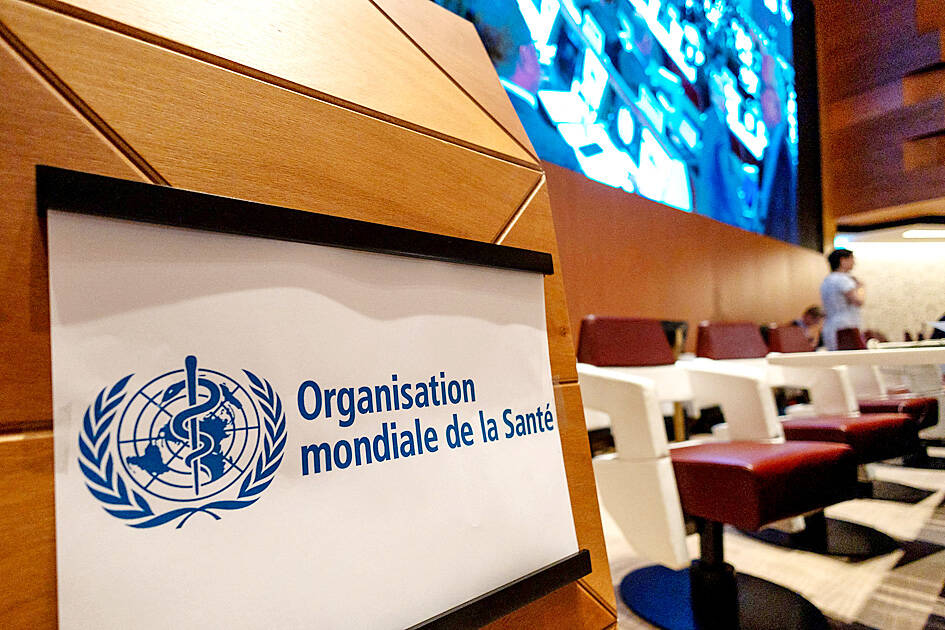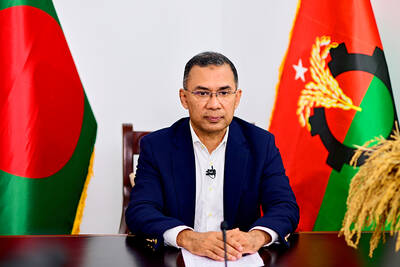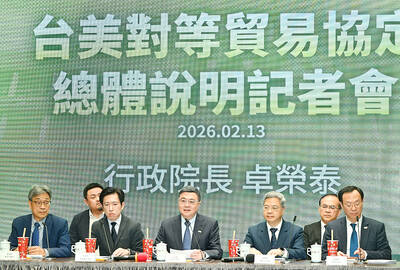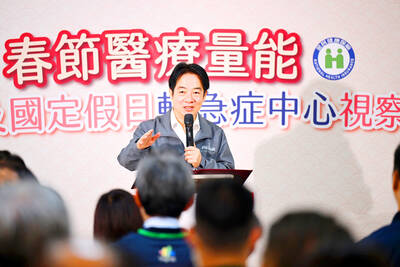A Taiwanese delegation is to depart for the World Health Assembly (WHA) in Geneva, Switzerland, on Friday next week, Minister of Health and Welfare Chiu Tai-yuan (邱泰源) said yesterday.
The WHA’s 78th annual assembly is to be held from May 19 to 27.
Taiwan has not received an official invitation, as in the previous eight years, and instead would send a “WHA Action Team,” led by Chiu, which would adopt a “half protest, half appeal” stance this year to advocate for Taiwan’s full participation in future assemblies, he said.

Photo: Reuters
This year also saw a 60 percent cut to the Ministry of Health and Welfare’s overseas travel budget, which would reduce the WHA Action Team by about one-third to 20 members, he added.
The delegation would follow the approach of previous years by engaging with like-minded countries to ensure Taiwan maintains a visible and active presence on the international stage, he said.
Twenty-one medical associations representing more than 500,000 healthcare professionals yesterday also held a news conference under the theme “One World for Health” to urge the WHO and the international community to allow Taiwan to officially participate in global health affairs.
The associations said that countries should cooperate to address shared challenges, including climate change, new strains of infectious diseases, chronic conditions and the impacts of aging populations.
Taiwan’s exclusion from the WHA contradicts the WHO’s goal of “One World for Health,” they said.
US President Donald Trump in January signed an executive order to withdraw the US from the WHO.
Asked if the US’ withdrawal could affect the WHA, Bureau of International Cooperation Director-General Shih Chin-shui (施金水) told reporters ahead of the conference that the US was just one of 194 countries within the WHO.
Although it would have a significant impact on finances, labor and ongoing programs, the WHA would still assemble as it does every year to discuss critical issues, he said.
Taiwan’s delegation plans to meet with representatives from more than 40 countries and major international organizations, he said, adding that specific details remain confidential, as the meetings are still being arranged.
The main focus of the WHA is expected to be the Pandemic Agreement, Shih said.
The Pandemic Agreement, a proposed international accord aimed at enhancing global pandemic prevention, preparedness and response, reached a consensus among WHO member states last month after two-and-a-half years of negotiations.
Last year, the WHO published the Global Health Strategy for this year to 2028, which aimed to increase health coverage worldwide, although Taiwan has “already achieved what many countries are only just setting out to achieve,” Taiwan Medical Association president Chou Ching-ming (周慶明) said.
Taiwan’s National Health Insurance system, which has been in place for 30 years, provides coverage to 99.9 percent of the population and has a public satisfaction rate of more than 90 percent, he said.
The system has successfully eliminated the cycle of health-related poverty — an important global health achievement, he added.
Since the COVID-19 pandemic, Taiwan has continued to provide international humanitarian aid and contribute meaningfully to global health efforts, he said.
Given this record, Taiwan’s medical professionals should not be sidelined from international academia or prevented from collaborating with global counterparts, he added.
At this critical moment in world affairs, transparent information sharing and global cooperation are key, and Taiwan’s experience and capabilities cannot be overlooked, he said.
The global medical community has consistently shown support for Taiwan, he added.
The World Medical Association, which represents millions of doctors worldwide, recently sent another letter to WHO Director-General Tedros Adhanom Ghebreyesus, reaffirming the importance of Taiwan joining the WHA and similar international health organizations, he added.

PEACE AT LAST? UN experts had warned of threats and attacks ahead of the voting, but after a turbulent period, Bangladesh has seemingly reacted to the result with calm The Bangladesh Nationalist Party (BNP) yesterday celebrated a landslide victory in the first elections held since a deadly 2024 uprising, with party leader Tarique Rahman to become prime minister. Bangladesh Election Commission figures showed that the BNP alliance had won 212 seats, compared with 77 for the Islamist-led Jamaat-e-Islami alliance. The US embassy congratulated Rahman and the BNP for a “historic victory,” while India praised Rahman’s “decisive win” in a significant step after recent rocky relations with Bangladesh. China and Pakistan, which grew closer to Bangladesh since the uprising and the souring of ties with India, where ousted Bangladeshi prime minister Sheikh Hasina

FAST-TRACK: The deal is to be sent to the legislature, but time is of the essence, as Trump had raised tariffs on Seoul when it failed to quickly ratify a similar pact Taiwan and the US on Thursday signed a trade agreement that caps US tariffs on Taiwanese goods at 15 percent and provides preferential market access for US industrial and agricultural exports, including cars, and beef and pork products. The Taiwan-US Agreement on Reciprocal Trade confirms a 15 percent US tariff for Taiwanese goods, and grants Taiwanese semiconductors and related products the most-favorable-treatment under Section 232 of the Trade Expansion Act, the Executive Yuan said. In addition, 2,072 items — representing nearly 20 percent of Taiwan’s total exports to the US — would be exempt from additional tariffs and be subject only to

NON-NEGOTIABLE: The US president’s action ran counter to one of the US’ ‘six assurances’ on not consulting China about arms sales to Taiwan, US lawmakers said US President Donald Trump’s admission that he is discussing arms sales to Taiwan with Chinese President Xi Jinping (習近平) is “alarming and a blatant violation of US policy and the six assurances,” US Representative Ro Khanna said on Tuesday. Trump on Monday said he would decide soon on whether to send more weapons to Taiwan, after Xi warned him not to do so. “I’m talking to him about it. We had a good conversation, and we’ll make a determination pretty soon,” Trump told reporters aboard Air Force One when asked about warnings raised by Beijing during a phone call with Xi over

REAL EMERGENCIES: To avoid overcrowding, the health minister urged people with mild or moderate symptoms to go to UCCs, while the ER should be for critical cases President William Lai (賴清德) yesterday inspected the nation’s Lunar New Year medical preparedness with a visit to an urgent care center (UCC) in Taipei and expressed confidence in the Ministry of Health and Welfare’s plans to prevent emergency room (ER) overcrowding during the nine-day holiday. The ministry in November last year launched a pilot UCC program to provide urgent medical care at 13 clinics in the nation’s six special municipalities over weekends and on holidays, aimed at relieving pressure on crowded ERs. To ease ER overcrowding during the Lunar New Year, when most hospitals and primary care clinics are closed, the National